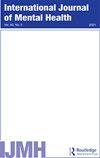土著精神卫生和戒瘾工作者孤立行医的经历
IF 1.7
Q3 PSYCHOLOGY, CLINICAL
引用次数: 0
摘要
背景在澳大利亚,土著居民和非土著居民在心理健康和成瘾结果方面的差距是有充分记录的。已采取将土著心理健康和戒毒工作人员纳入主流心理健康服务的做法,以提供更符合文化的服务,并解决健康差距问题。然而,利用角色和策略来支持这个劳动力的过程是不清楚的。本研究旨在了解两所大都会医院及卫生服务中心(hhs)的外籍医疗工作者的经验,以协助制定政策及人力支援策略。对IMHA工作人员(n = 17)进行深入的半结构化访谈,并进行主题分析。结果IMHA的员工队伍非常有价值,但复杂,面临着具有挑战性的系统性障碍。孤立的经历、缺乏文化安全感和对实践的限制是很常见的。这种情况给IMHA员工造成了困难,并破坏了他们以IMHA员工喜欢的方式工作的效率。加强IMHA工作人员的文化安全是为土著消费者提供文化上适当的服务的重要前提。IMHA员工的文化安全与消费结果和体验的相互作用是未来研究的一个重要领域。本文章由计算机程序翻译,如有差异,请以英文原文为准。
The experience of isolated practice for Indigenous mental health and addictions workers
Abstract Background In Australia, the gap in mental health and addictions outcomes between Indigenous and non-Indigenous people is well documented. The integration of Indigenous mental health and addictions (IMHA) workers into mainstream mental health services has been adopted to provide more culturally appropriate services, and address health disparities. However, processes for utilizing the role and strategies for supporting this workforce are unclear. This study aimed to understand the experiences of IMHA workers in two Metropolitan Hospital and Health Services (HHSs) to assist in the development of policy and workforce support strategies. Methodology In-depth semi-structured interviews were conducted with IMHA workers (n = 17) and analyzed thematically. Results The IMHA workforce is extremely valuable, but complex, and confronted by challenging systemic barriers. Experiences of isolation, lack of cultural safety, and limits on practice are common. This situation creates difficulty for the IMHA workers and undermines their effectiveness to work in ways preferred by the IMHA workers. Conclusion Enhancing cultural safety for the IMHA workforce is a crucial precursor to achieving culturally appropriate service provision for Indigenous consumers. The interaction of cultural safety for IMHA workers with consumer outcomes and experiences is an important area for future research.
求助全文
通过发布文献求助,成功后即可免费获取论文全文。
去求助
来源期刊

INTERNATIONAL JOURNAL OF MENTAL HEALTH
PSYCHOLOGY, CLINICAL-
CiteScore
3.80
自引率
20.00%
发文量
32
期刊介绍:
The official journal of the World Association for Psychosocial Rehabilitation, the International Journal of Mental Health features in-depth articles on research, clinical practice, and the organization and delivery of mental health services around the world. Covering both developed and developing countries, it provides vital information on important new ideas and trends in community mental health, social psychiatry, psychiatric epidemiology, prevention, treatment, and psychosocial rehabilitation.
 求助内容:
求助内容: 应助结果提醒方式:
应助结果提醒方式:


